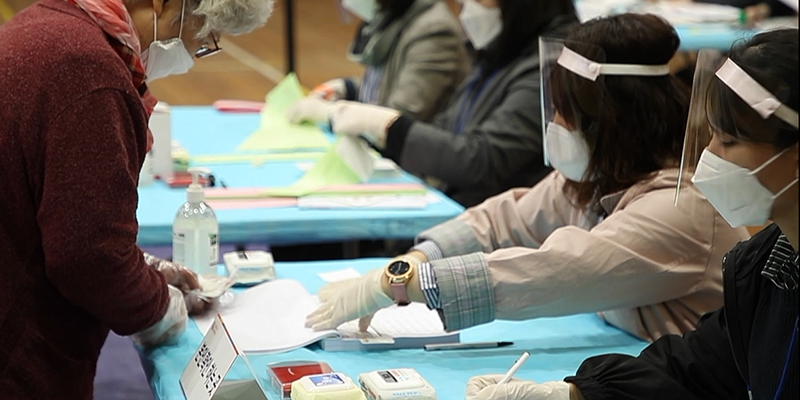Electoral officials need more money to run elections during Covid-19
Erik Asplund, Toby James and Alistair Clark audit the additional costs countries are facing to run safe and accessible elections during the Covid-19 pandemic. They argue it is vital that election management is sufficiently well funded during this crisis to maintain voter participation and trust in electoral outcomes.

Picture courtesy of the Republic of Korea National Election Commission
Money matters for elections. Those candidates and parties who have most in their election treasure chest are able to invest more on the campaign trail. But less well-known is that money also matters for the smooth running of elections.
Elections are not cheap. They involve employing thousands of temporary staff, hiring premises and producing huge volumes of election material. The difficulty for democracy is that, as recent comparative research on the funding of elections shows, electoral officials often face challenges receiving sufficient funds. Focus groups of electoral officials reveal that common problems include little awareness of the need for investment in election funding, so proactive lobbying by election administrators is often needed. Short-term responses to election funding make elections more expensive because it leaves contractors with a stronger bargaining position, leading to higher prices. Procurement and administrative processes do not fit with the political realities of snap elections. Meanwhile, unforeseen costs rack up because of unexpected events but rising expectations from citizens about quality of service.
The rising election costs because of Covid-19
Elections have often seen rising costs, but these financial challenges have increased in scope due to the Covid-19 pandemic. This is primarily because of costs related to risk mitigation measures, which include both health and safety and special voting arrangements. Countries that have held national or subnational elections during the pandemic, including Australia, the Dominican Republic, France, Mongolia, Poland, Russia, Singapore, South Korea and the USA, have purchased personal protective equipment (PPE) such as face shields, medical gloves and protective clothing for polling officials and sometimes masks and/or vinyl gloves for voters. These have often been acquired at very short notice in accordance with guidelines provided by health authorities. For polling stations or voter registration centres, electoral management bodies have also needed hand sanitisers, sanitising tissues, contactless thermometers, plexiglass screens and tape rolls. Some countries have also seen increased use of special voting arrangements which includes early voting (South Korea), postal voting (Styria/Austria, Bavaria/Germany, several states in the USA and Poland), mobile box voting (Singapore) and proxy voting (France) in order to reduce crowds on election day and so lower the risk of infection. These arrangements, including additional staff, facilities and materials, have undoubtedly increased the cost of elections in each country.
Costs are notoriously difficult to extract on the running of elections, leading to alternative measures being used. However, raw costs are still illustrative and important. Table 1 provides a summary of some of the publicly stated estimates of the additional costs for running elections, converted to US dollars. It shows a considerable hike in the investment needed – which varies according to the extent that additional measures are necessary (and purchasing parity).
| Jurisdiction | Additional costs cited | Estimated additional cost quoted (US dollars) | Voting age population | Additional cost per voter ($) |
|---|---|---|---|---|
| Australian Capital Territory | Early voting; staff hours; public information campaigns | $1.6 million | 283,162 | 5.65 |
| Canadian province of Saskatchewan | Face masks and thousands of litres of hand sanitiser and disinfectant | $0.3 million | 815,000 | 0.38 |
| Indonesia | Health measures | $ 98.8 million | 191,671,984 | 0.52 |
| South Korea | Personal protective equipment | $ 16 million | 43,814,504 | 0.37 |
| Sri Lanka | Hand sanitisers and additional works | $32–37 million | 15,262,770 | 2.26 |
| Uganda | Train polling officials; temperature checks; hands sanitisers | $14.6 million | 17,110,660 | 0.85 |
| Ukraine | Unspecified | $46 million | 35,723,124 | 1.29 |
| USA | Postal voting; in-person voting; online registration; public education | $2 billion | 255,152,703 | 7.84 |
Source: Authors, constructed using media reports and EMB data
Ahead of 3 November 2020, there has been considerable global interest in the US Presidential elections. Here, state election commissions are facing shortages of funds to recruit additional poll workers and purchase election materials. Meanwhile postal voting, which is an important safety measure to help reduce crowds on election day and thereby the risk of infection, can cost more. Recent primary elections in the US state of Kentucky were held both in person and through postal voting. State officials are estimating that the cost of running them may have been US $12 million instead of US $9 million, with the increased costs associated with extra staff needed to count votes as well as materials needed (postage and printing). Election boards in Georgia and Ohio – both of which reported increased election expenses during primary elections – are also seeking additional funds for forthcoming elections including the November Presidential election. The Federal coronavirus stimulus legislation (CARES Act) has earmarked some funds for US elections and the US Congress has set aside US $400 million for the election in a bill passed in March 2020. But the Brennan Center has since advocated for more funding (quoted in Table 1). Also the US $3.6 billion election package which is part of a larger economic bill has come to a standstill in the US Senate.
Beyond the USA, other election management bodies have also requested increased funding from central or local governments. For example, the Australian Capital Territory election commission has requested an extra AUD 2.3 million (US $1.6 million) to organise the 16 October 2020 ACT legislative assembly elections. Funds would pay to expand early voting arrangements from five early voting centres to 15 centres with extended staff hours for a period of 20 days as well as public information campaigns about the benefits of early voting. The Central Election Commission of Ukraine has requested from the government and parliament some UAH 1.252 billion (US $46,000,000) in additional funding to hold the October 2020 local elections. The National Election Commission of Sri Lanka believes that the July 2020 parliamentary election will cost between six and seven billion rupees (US $32–37 million) extra, in which 1 billion (US $5,332,530) will be spent on hand sanitisers and additional works. Rp 1.4 trillion (US $98.78 million) in extra funding has been requested for the the 2020 simultaneous regional elections in Indonesia. In Thailand, local elections scheduled for 2020 may suffer further delays as the funds earmarked to finance the election have been shifted to fight the pandemic.
South Korea provides an example that has already held elections during the pandemic from which we can draw considerable lessons. In April 2020, its National Election Commission (NEC) organised a parliamentary election that resulted in an historically high 66.2% voter turnout (with 29.12 million ballots cast). The NEC implemented a range of health and safety measures and expanded early voting arrangements in order to allow a larger number of people to vote before election day irrespective of their residence. Preliminary estimates suggest that the cost of the parliamentary national election was 226.7 billion Korean won (US $189 million), compared with the 203.4 billion Korean won (US $170 million) for the 2016 parliamentary election. The increased costs were attributed to 1) inflation; 2) an increase of eligible voters from 42,056,325 to 43,968,199; and 3) measures related to Covid-19, in particular personal protective equipment (PPE). Covid-19 measures alone came to 20 billion Korean won (US $16 million), which equates to approximately 9% of the total election cost.
Why investment matters
It is not just that costs are increasing, but that budgets are shrinking. The World Bank has issued ominous forecasts for economies around the world, suggesting that Covid-19 will spark one of the deepest recessions in years. In this context elections will be competing against many other services for funding. Elections are a necessary investment, rather than a cost, however.
Elections are essential for the democratic process. They are the opportunity for citizens to hold government to account and choose their own representatives. Many elections have understandably been postponed for public health reasons. There is a further risk, though, that elections will also be affected because of financial reasons. Bosnia-Herzegovina has already postponed local elections that were scheduled in October, owing to the failure of the government to pass the budget. Mongolian President Khaltmaa Battulga proposed to postpone the country’s parliamentary elections because he felt that ‘we are spending a lot of money on implementing the epidemic prevention measures.’
Even where elections are held, this might be under compromised conditions. Sufficient safety equipment might not be provided to guarantee the safety of election staff. Without sufficient interventions to reassure voters, turnout could be hit, especially amongst those with underlying health conditions. Evidence shows that there is a positive relationship between resourcing and election quality. Better-run elections are often those which are better resourced. Studies from the UK, USA and comparative research has established this link. When funding is cut, election quality is cut. Healthy and fair elections therefore require investment.
The costs of not investing in elections is therefore potentially much more substantial. When citizens feel that the electoral process has been unfair, their trust in government and states can be affected. This does not return easily. When political parties and supporters feel that the election has not been conducted properly, in more fragile situations, conflict and civil war can erupt.
It is therefore impossible to put a cost on democracy. Investment in elections is one area where budgets should not be slashed during or after the pandemic – and further funds will need to be invested following principles of sufficiency, transparency, sustainability, legitimacy and contingency to ensure voter and staff safety in a process conducted with integrity. The longer-term costs of not doing this will be much more considerable.
Disclaimer: Views expressed in this commentary are those of the authors, one of whom is a staff member of International IDEA. This commentary is independent of specific national or political interests. Views expressed do not necessarily represent the institutional position of International IDEA, its Board of Advisers or its Council of Member States.
This post gives the views of the authors, and not the position of Democratic Audit.
About the authors

Erik Asplund is a Programme Officer in the Electoral Processes Programme, International IDEA. He is currently managing the Global Overview of COVID-19: Impact on Elections project. Other focus areas include Electoral Risk Management, Financing of Elections and Training in Electoral Administration with an emphasis on BRIDGE and Electoral Training Facilities.

Toby James is a Professor of Politics and Public Policy at the University of East Anglia, UK. His most recent books are Comparative Electoral Management (Routledge, 2020) and Building Inclusive Elections (Routledge, 2020). He is co-convenor of the Electoral Management Network.

Dr Alistair Clark is Reader in Politics at Newcastle University. He has written widely on electoral integrity and administration, electoral and party politics. He is author of Political Parties in the UK, 2e (Palgrave 2018). He tweets at @ClarkAlistairJ.





 Democratic Audit's core funding is provided by the Joseph Rowntree Charitable Trust. Additional funding is provided by the London School of Economics.
Democratic Audit's core funding is provided by the Joseph Rowntree Charitable Trust. Additional funding is provided by the London School of Economics.